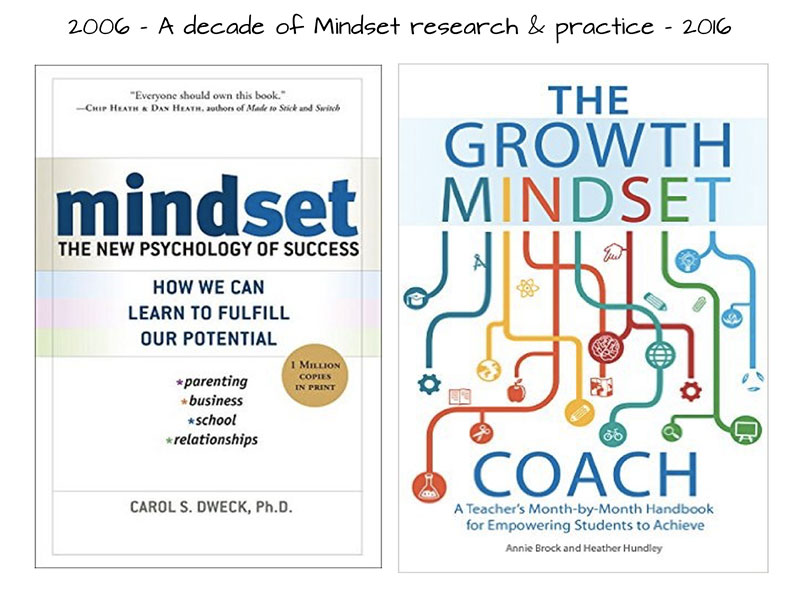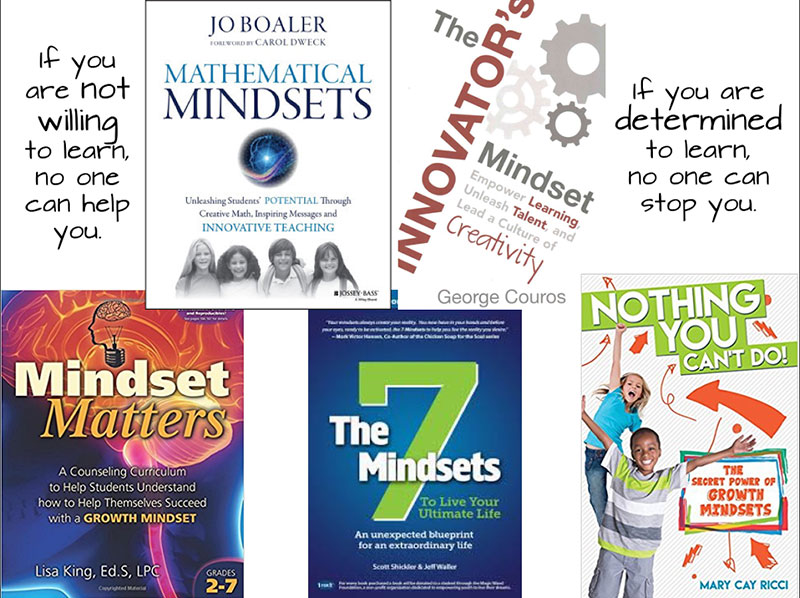Why Mindset Matters
We used to believe that our intelligence is fixed, that we were born predisposed to a certain IQ. We now know that the brain acts like a muscle and that the more we use it, the stronger it becomes.
What is growth mindset (1)? A person with a growth mindset believes that intelligence can be developed so she embraces challenges, gives best effort, learns from feedback, becomes inspired by other’s successes, and believes that intelligence can change with hard work.
Conversely, a person with a fixed mindset believes intelligence is static and therefore he may avoid challenges, give up easily, ignore feedback because he sees it as criticism, feel threatened by other’s successes, and try hard to appear smart or capable.
Mindset isn’t an all or nothing deal; it is common for someone to vacillate between the two mindsets. In fact, Carol Dweck, author of Mindset, believes that since people are a hybrid of both, it’s important to teach about mindset so that we know when we’re operating with a fixed belief that we could benefit from unlocking.
Since the release of Dweck’s groundbreaking research a dozen years ago, many more books have been written on the topic. Some of my favorites include Mindset by Carol Dweck, The Growth Mindset Coach by Annie Brock and Heather Hundley, 7 Mindsets by Scott Shickler and Jeff Waller, The Innovator’s Mindset by George Couros, Mathematical Mindsets by Jo Boaler, Mindset Matters by Lisa King, and my most recent find written specifically for intermediate-aged students, Nothing You Can’t Do by Mary Cay Ricci.
Here are some of the key takeaways that I have gleaned from studying these texts about what we as educators, parents, and caregivers can do to nurture a growth mindset in our future leaders.
- Model growth mindset and seize those teachable moments to talk about it and grow alongside your children. Use your hands to show how the brain might look in fixed (a fist) versus growth (opened hand) mindset mode.
- Embrace and celebrate mistakes as learning opportunities. Let go of perfectionism; embrace the word FAIL as First Attempt In L Challenge yourself and your children to work and play outside of our comfort zones by attempting difficult tasks and projects. Share your stories of failure or the struggles of well-known-and-respected people who failed before they succeeded, like Walt Disney, Michael Jordan, Oprah Winfrey, Steve Jobs. Growth (and magic!) happens in our discomfort zones.
- Value growth over grades and praise the process over the product. Champion effort, goal setting, and perseverance. Say things like, “You must have worked really hard on that.” and “Wow, that shows a lot of resilience and grit.”
- We are who we are and we do what we do because we think what we think. We can change errant beliefs by unlocking negative thoughts. The way we talk to ourselves makes a huge difference in the way we approach new things. Reframe thoughts {Am I buried or planted?} and add the magic word YET whenever you can {I can’t hit a home run yet!} and model that as you teach those in your care to do the same.
- Remind children that our brains are always growing, especially when we persist through difficulties and work hard to learn something new. Consider this: Taking the well-worn path through the forest does nothing to grow your brain, but taking the road less-traveled or, better yet, forging a new trail will help create new neuronal pathways so your brain can experience growth (neuroplasticity). Teach your children this rhyme to help them remember: Neurons that fire together, wire together. (2)
- Dweck, C.S. (2006). Mindset: The new psychology of success. New York: Random House.
(2) Brock and Hundley (2016): The Growth Mindset Coach. Berkeley, CA: Ulysses Press


